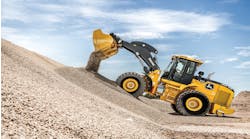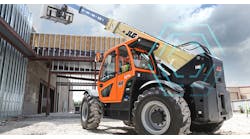RER: The industry went through a few lean years and now is in a strong up-cycle. How long will this cycle last and how should rental companies manage during this cycle, which also won't last forever, to avoid repeating the mistakes that contributed to the early '00s down cycle?
DeFeo: The key to sustainable growth is an acceptable level of return on investment. The current up-cycle will not last forever, but the best protection is planned growth and a balance of proper investments without adding too much permanent cost. Rental companies must remember that getting excellent returns requires some form of differentiation in service and support. This has to go beyond availability and pricing. The key to profitability is getting rates up. If rates are not up now then it will be much more difficult to have a sustained business when the industry turns down.
What are the dangers of inflation and should rental companies and manufacturers be managing with the dangers of inflation in mind?
This is an industry that can sustain a little inflation as the prior downturn took a toll with substantial deflation! We have to remember that used equipment values dropped dramatically. Special offers can cause customer expectations for value on equipment to be unreasonable. My advice, don't be worried about inflation. Our industry can handle it.
The costs of fuel and many kinds of materials are on the rise, a trend that is likely to continue. How will these rising costs affect manufacturers and rental companies and how can companies deal with this issue?
Get ahead of the trend and accept pricing from manufacturers as well as be disciplined about passing cost increases on. When or if costs begin to come down, hold on to some of the gains you have made and put some savings away for a rainy day. Deal with your problems now and do not put mistakes off to a future period. Equipment is not like a fine wine — it does not get better with age!
Expectations are high that the current up-cycle will continue for another year or more. Do you agree with these projections?
I think we are in for several — probably three more good years depending on the product type and geography. The challenges manufacturers are having in meeting demand on certain products probably is helpful for the industry overall. Too much equipment too fast is in no one's interest, in my view.
How do you expect relationships between manufacturers and rental companies to change in the foreseeable future?
Rental companies will require better service from manufacturers. This is going to mean different ways of local support and better supply planning. I think those manufacturers that can supply a broad array of rental company needs will be more desirable for rental companies. The value of the overall relationship will be the winning strategy.
I've noticed that Terex has become more involved in the Chinese market. What can you share about your assessment of the Chinese market for construction equipment? Will Chinese manufacturers soon become major players on an international scale?
I do not know if Chinese suppliers will be prepared to participate on the global market when the domestic Chinese market is so large. I think this will be their initial focus and Terex' interest is to figure out what we need to do to participate in the very large market. It will not be simple and we expect it will take many years.
Do you expect to see greater expansion on the part of national rental companies in the United States in the coming year?
I think the trend will be to fill in markets where national and regional chains can generate substantial operational and customer efficiencies. The emphasis is on positive cash flow and returns on capital. This type of expansion meets this goal.
Do you see an international growth in rentals? Is the concept of rentals catching on around the world — Asia, Middle East, Africa, Latin America?
Rental will always have a place in markets. It is a form of risk balancing between the user, financing sources and the rental company or distributor offering the service. This works anywhere capitalism is present, no matter what the language.
Rental people I've spoken to recently have mentioned long lead times in efforts to acquire new equipment. I don't know specifically how Terex is dealing with this, but any thoughts about this question? Is this situation likely to change or might it become even more difficult in the coming year if demand stays strong as expected?
I do not think this will be an ongoing problem. We do need better planning between rental companies and manufacturers. Not placing orders and then waiting to bundle orders in order to get better prices — tactics like this need to be replaced by teamwork and collaboration.
Any thoughts you'd like to share on Terex' plans in the near future?
You will see Terex continue to work on integrating its various businesses in order to do a better job building a common franchise and increasing the value of Terex equipment. We grew Terex via acquisition and now we will grow Terex by weaving a stronger fabric through operating initiatives.
Any other parting thoughts?
Yes, continue to seek out young people that are hungry to make a difference in our industry. We do a great service to society by helping to construct things that make our lives better. We need the next generation to own this challenge of doing better than we have. This is everyone's priority.





